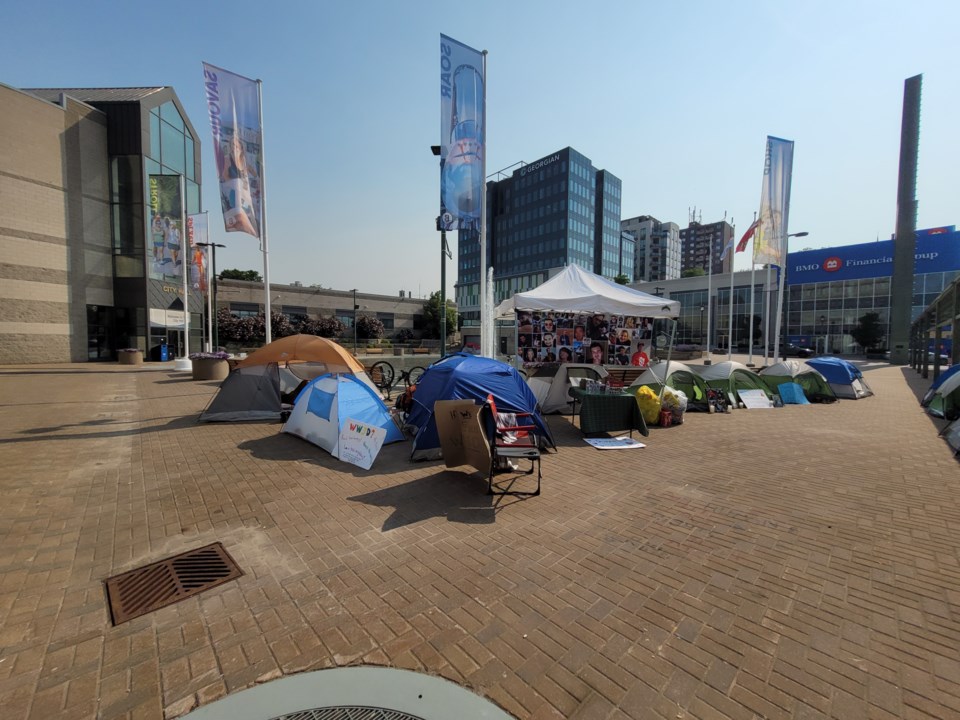BarrieToday welcomes letters to the editor at [email protected]. Please include your daytime phone number and address (for verification of authorship, not publication). The following letter from members of the Barrie Housing and Homelessness Justice Network is in response to 'Complex problem': Council takes aim at chronic homelessness,' published May 17, and 'Council paints stark picture around need for homelessness plan,' published May 18.
On May 17, Barrie city council unanimously passed a motion without notice, instructing city staff to consider a series of actions to address homelessness in our city.
Some actions, like funding warming/cooling centres and food programs, are welcome.
The motion also directed staff to use bylaws to ban giving money to those who panhandle and to ban the distribution of tents, tarps and food on public property. And while we haven’t seen any cooling centres or food programs yet, the bylaw to criminalize helping our unhoused neighbours by providing basic survival supplies is set to pass at (tonight's) Barrie city council meeting with no opportunity for public input or engagement.
A nuisance bylaw from 2004 is being amended to reverse the section that says that items can be given away by non-profits to instead make it illegal for anyone to give away “food, clothing, tents, tarps or other similar item used as a shelter, to assist with sleeping or protection from the elements.”
Fines are set at up to an astonishing $100,000, and the bylaw will be enforceable immediately if passed as written during Wednesday’s meeting. Additional amendments presented in Bill 67 expand the current ban on tents and sunshades at the waterfront to cover the whole city.
These bylaw amendments are in direct conflict with a precedent-setting Ontario Superior Court ruling from January that found bylaws that prohibit people from setting up shelter on public property when no other shelter is available to them violate Section 7 of the Canadian Charter of Rights and Freedoms, which protects the right to life, liberty and security of the person.
Justice Valente ruled that denying the ability to erect a shelter violates the right to life and “interferes with the population’s choice to protect itself from the elements.”
We find this new planned bylaw to be not only mean-spirited and legally dubious, but we also genuinely question the desired outcome. How does this help address homelessness? How does it help keep anyone safe?
Supporters of the bill maintain that people and organizations can still provide support from private property, and we have also heard that it isn’t criminalizing homelessness if no one goes to jail.
While unhoused individuals and the people that support them may not face jail time as a result of these types of anti-homeless bylaws, it is still considered a form of criminalization. It uses the legal system to punish people who are living in poverty and/or are unhoused.
Studies have found that consistent, punitive interactions with police and bylaw officers, even those that do not result in arrest and incarceration, cause both material and psychological harm. These anti-homeless laws limit access to street outreach services while damaging the health, safety, and well-being of those targeted and still fail to reduce “urban disorder.”
“Though each of these interactions alone may seem inconsequential, collectively, the process of pervasive penalty produces a sequence of criminal justice contact that is more powerful than the sum of its parts and perpetuates homelessness and poverty,” writes Chris Herring in his 2020 study.
By creating barriers to providing survival supplies and adding another layer of punitive surveillance to those who rely on them, this bylaw is more likely to perpetuate homelessness than it is to reduce it.
This whole thing needs a rethink, and allowing the public, including the people using and providing these services, to share in an open forum what would actually be helpful would be a great place to start.
We hope council will rethink this harmful approach and not proceed with the proposed bylaws at Wednesday’s meeting.
Jennifer van Gennip
Hayley Murdoch-Fyke
Brandon Rhéal Amyot
Christine Nayler



